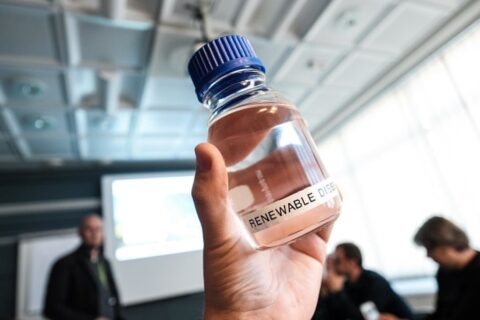Essential Tips for Storing and Handling Biodiesel
Biodiesel is produced through the chemical process of transesterification, where fats or oils are converted into fatty acid methyl esters (FAME). This process removes contaminants and produces a fuel that meets stringent quality standards. Despite its benefits, biodiesel is sensitive to certain storage and handling conditions.
Biodiesel is a renewable, clean-burning alternative to diesel that can be used in regular current diesel engines without needing any modifications. However, to maintain its quality and efficiency, proper biodiesel storage and biodiesel handling are crucial. In this blog, we’ll explore essential tips for storing and handling biodiesel, ensuring its longevity and performance.
Key Factors in Biodiesel Storage
Proper Storage Temperature
Biodiesel has a higher cloud point than petroleum diesel, meaning it begins to gel at higher temperatures. It’s essential to maintain biodiesel storage temperatures above its cloud point, especially in colder climates. Ideally, biodiesel should be stored at temperatures between 4°C and 21°C (40°F and 70°F).
Storage Tank Materials
Biodiesel storage tanks should be made from compatible materials to prevent reactions that could degrade the fuel. Suitable materials include stainless steel, aluminum, fluorinated polyethylene, and fiberglass. Avoid using tanks made of uncoated mild steel, copper, brass, lead, tin, and zinc, as these can react with biodiesel, causing contamination.
Preventing Water Contamination
Water is one of the primary contaminants of biodiesel. It can promote microbial growth, leading to fuel degradation and clogged filters. To minimize water contamination:
- Use water-tight biodiesel storage tanks.
- Regularly inspect and drain water from tanks.
- Keep tank vents covered to prevent moisture ingress.
Protecting from Light and Oxygen
Exposure to light and oxygen can accelerate the oxidation process, leading to the formation of sediments and acids. Biodiesel storage tanks should be opaque and sealed to minimize exposure to these elements.
Best Practices for Biodiesel Handling
Handling Procedures
Proper biodiesel handling procedures are essential to maintain fuel quality and ensure safety:
- Always use clean, dry equipment when transferring biodiesel.
- Avoid mixing biodiesel with other fuels or contaminants.
- Handle biodiesel gently to prevent foaming and air entrainment, which can introduce water and oxygen.
Monitoring and Testing
Regularly monitor and test biodiesel for quality assurance. Key parameters to check include:
- Water content: Should be below 500 ppm (parts per million).
- Oxidation stability: Indicates how long biodiesel can be stored without significant degradation.
- Acid number: A measure of free fatty acids, which increase as biodiesel degrades.
Consider using additives to improve biodiesel fuel storage stability and performance. Common additives include:
- Antioxidants: Prevent oxidation and extend storage life.
- Biocides: Inhibit microbial growth in storage tanks.
- Cold flow improvers: Lower the cloud point, making biodiesel suitable for use in colder temperatures.
Maintenance of Biodiesel Storage Tanks
-
Regular Inspections
It is vital to inspect biodiesel storage tanks on a regular basis for signs of leaks, corrosion, and contamination. Such inspections should include checking for any visible damage or wear on the tank’s surface, as well as monitoring for unusual odors or discoloration of the fuel. Addressing any issues promptly can prevent fuel degradation, ensure the quality of the biodiesel, and avoid potential environmental hazards. Keeping a detailed inspection log can help track the tank’s condition over time and identify recurring problems that need more permanent solutions.
-
Cleaning
Periodically cleaning biodiesel storage tanks is essential to remove sediments, microbial growth, and other contaminants that can accumulate over time. This can be done using appropriate tank cleaning methods and solutions that are specifically designed for biodiesel. Ensure that tanks are thoroughly dried after cleaning to prevent water contamination before refilling with biodiesel. Regular cleaning helps maintain the purity and quality of the fuel, preventing potential clogging of fuel systems and extending the lifespan of the storage tanks. Scheduling routine cleanings based on usage patterns can help keep the tanks in optimal condition.
-
Filtration
Installing filtration systems is a crucial step in removing particulate matter and water from biodiesel during storage and transfer. These filtration systems should be capable of filtering out fine particles and moisture that can cause fuel contamination and degradation. Filters should be checked and replaced regularly to ensure they are performing optimally. Effective filtration not only improves the quality of the biodiesel but also protects the fuel system components from damage. Incorporating high-quality filters and maintaining a strict filtration schedule can significantly enhance the reliability and performance of biodiesel fuel handling operations.
Handling Biodiesel Fuel in Vehicles
Fuel System Maintenance
Maintaining the vehicle’s fuel system is essential to prevent issues associated with biodiesel handling. Biodiesel has a natural solvent property that can clean out deposits left by petroleum diesel in the fuel system, which may initially lead to clogged filters. Therefore, it is crucial to regularly check and replace fuel filters, especially when first switching to biodiesel or higher biodiesel blends. Additionally, ensure that the fuel lines and injectors are free from blockages and in good working condition to avoid any disruptions in fuel flow and engine performance.
Blending with Petroleum Diesel
Blending biodiesel with petroleum diesel can significantly enhance cold flow properties and oxidation stability, which are vital for maintaining biodiesel fuel storage quality and performance. Common blends like B20 (20% biodiesel, 80% petroleum diesel) and B5 (5% biodiesel, 95% petroleum diesel) offer a balanced mix of the benefits of both fuels. It is important to ensure that blending is done correctly to maintain fuel quality and prevent any issues related to improper mixing. Using the right blending techniques and equipment can help achieve a consistent and reliable fuel blend suitable for varying operational conditions.
Seasonal Adjustments
Adjusting biodiesel blends seasonally is a practical approach to managing biodiesel fuel handling in different temperature conditions. In warmer months, higher biodiesel blends can be utilized, taking advantage of biodiesel’s superior lubricity and cleaner emissions. Conversely, in colder months, lower biodiesel blends are recommended to prevent gelling and ensure smooth fuel flow. This seasonal adjustment helps maintain optimal engine performance and fuel efficiency throughout the year. Monitoring local climate conditions and adjusting blends accordingly can minimize potential cold weather-related issues, ensuring reliable vehicle operation year-round.
Conclusion
Proper biodiesel storage and biodiesel handling are critical for maintaining fuel quality and ensuring efficient, trouble-free use. By following these essential tips, you can maximize the benefits of biodiesel while minimizing potential issues related to contamination and degradation. For more information on biodiesel fuel storage and handling or to purchase high-quality biodiesel, visit Ricochet Fuel Distributors. They offer a wide range of biofuels and can provide expert advice on all your biodiesel needs.
By adhering to these guidelines, you can ensure that your biodiesel remains stable, efficient, and ready for use, providing a reliable and sustainable alternative to conventional diesel fuels.


